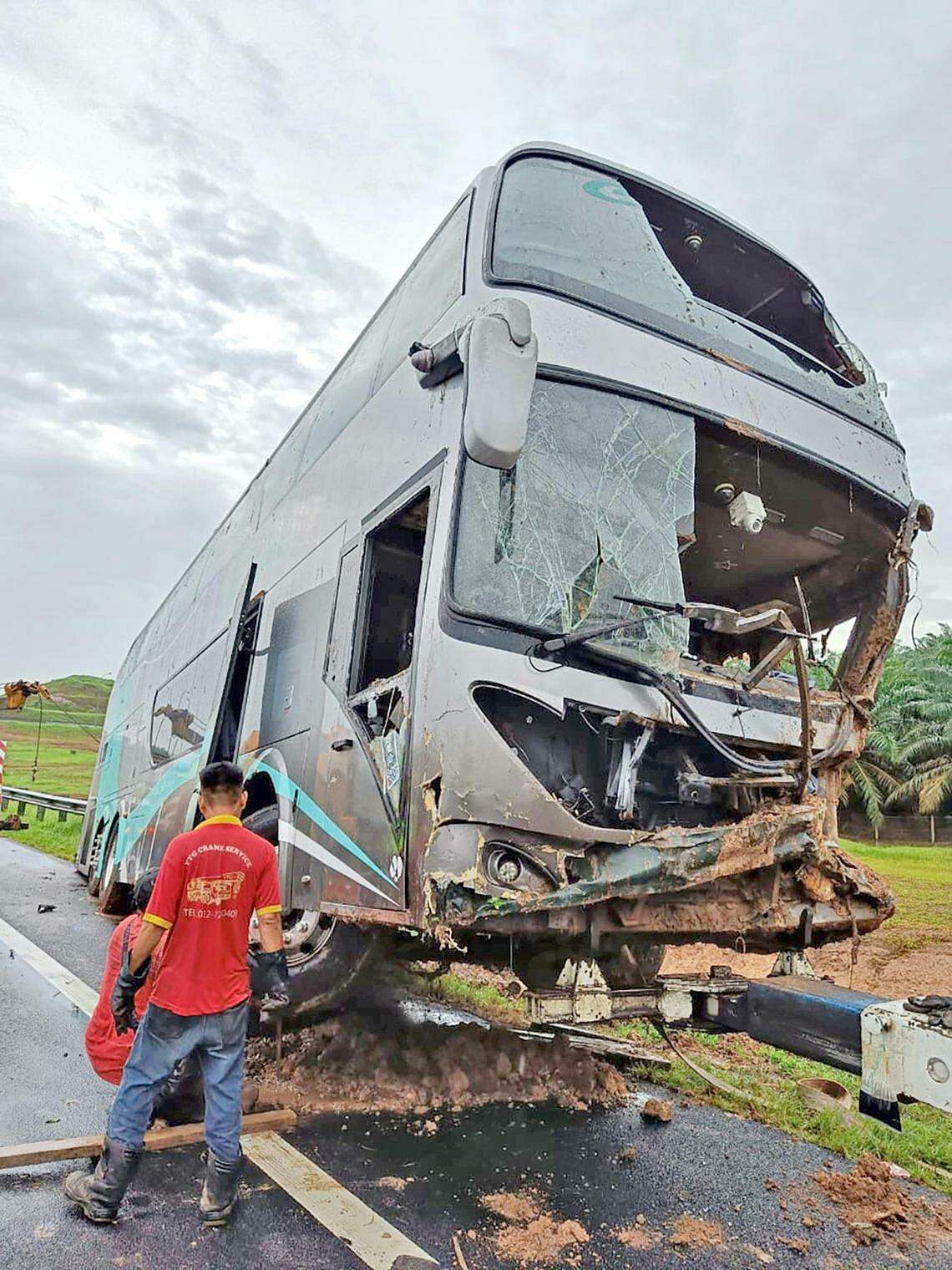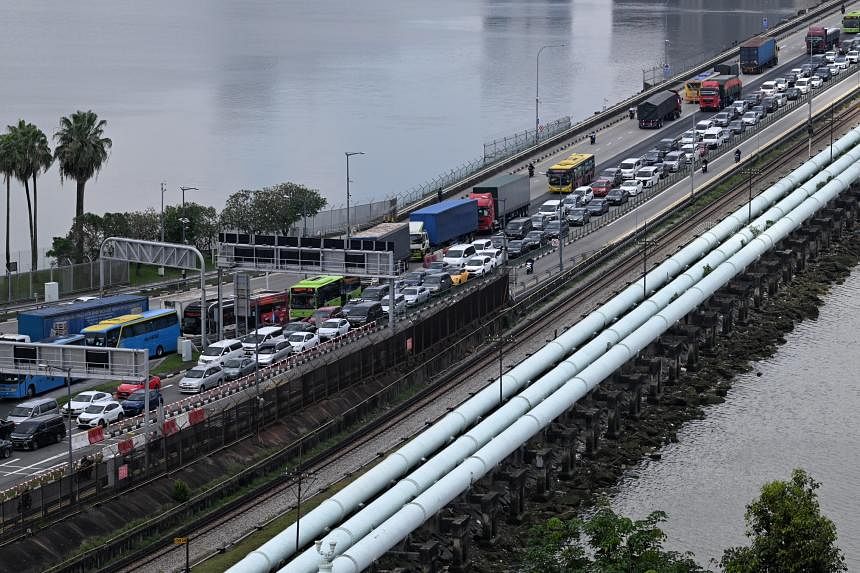SINGAPORE – Several harrowing road accidents have taken place on Malaysia’s North-South Highway in recent months, involving coaches that ply the route between Singapore and various Malaysian destinations daily. Injuries, damage to belongings and even fatalities were reported in relation to some of the accidents.
Factors such as weather and road conditions, the quality of vehicles, and how well-rested, experienced or cautious drivers are, play a role in the quality of your journey and whether you eventually arrive at your destination safely.
The Straits Times spoke to travel and legal experts about things to consider when travelling across the Causeway by coach and what to do if the bus one is travelling in is involved in an accident.
Q: What factors should I consider when preparing for my trip?
A: International SOS security manager Ooi Boon Haw said travellers who opt for coach travel to and from Malaysia need to be aware that those services tend to be long overland journeys.
“One should educate themselves on the inherent risks associated with such trips, namely, road accidents and driver fatigue,” he added.
“(Those who) intend to take coach rides between Singapore and Malaysia should avoid overnight coaches, as the drivers are more likely to go over the speed limit and engage in hazardous driving practices.”
He also urged travellers to research and establish “the coach company’s history of safe or unsafe practices prior to booking their trips in order to minimise risks”.
Mr Ooi noted that travellers should also have the contact details of the police or ambulance services in Malaysia on hand since that would be their first point of contact during accidents.
Additionally, it is useful to have the contact of a local host in the country. The key contacts should be saved in one’s mobile phone or written on a piece of paper, said Mr Ooi.
“Separately, if the traveller encounters a driver with unsafe driving practices, the traveller should promptly voice their concerns to the driver and the coach company in a firm but respectful tone.”
Q: Is it necessary to buy insurance if I am travelling by coach to Malaysia?
A: Ms Annie Chang, a director overseeing travel agents and tourist guides at the Singapore Tourism Board (STB), encourages travellers to purchase travel insurance for their coach bookings.
“(One should also) read through the terms and conditions of their purchase, to protect themselves against unforeseen circumstances when booking their holiday, like insolvency of the travel agent, trip cancellations and accidents,” she added.
“In the event of an accident, consumers can then reach out to their insurers for advice on the next steps.”

Ms Chang also advises travellers to purchase travel products from licensed travel agents listed on STB’s Trust website here.
Mr Desmond Lin, founder of Multitude Insurance Agency Services, said that there are specially designed travel insurance packages that cover day trips or weekend getaways via coach and ferry to Malaysia, Indonesia and Thailand.
“(This will offer) greater peace of mind to cover for travel inconvenience, personal accident and medical expenses,” said Mr Lin.
Q: Do I need to register with the Ministry of Foreign Affairs if I am travelling to Malaysia?
A: Singaporeans are strongly encouraged to e-register their overseas travel plans with the Ministry of Foreign Affairs (MFA), said Foreign Minister Vivian Balakrishnan in a written parliamentary reply on Jan 10.
The information provided to MFA will allow it to contact travellers in order to make sure they are safe and, if need be, assist them should an emergency occur.
Dr Balakrishnan said: “Assisting Singaporeans in distress is a priority... We will quickly reach out to local authorities and medical institutions to check on the condition of the affected Singaporeans, and then ensure that they receive the necessary medical attention.
“We will assist to inform their next of kin in Singapore and render consular assistance to these family members. This may include linking them up with local doctors or providing information to facilitate medical repatriation if the families decide to bring their injured loved ones home for treatment.”
In the event of a death, MFA will be able to advise the deceased’s next of kin on the procedures in relation to funeral services, local cremation, and/or the repatriation of the body.
“We will help the families reach out to the relevant local authorities to obtain the necessary documentation to repatriate the body or the cremated remains,” said Dr Balakrishnan.
He added that Singaporeans are advised to purchase comprehensive travel insurance to cover unexpected expenses, including medical costs, during their overseas trips.
Q: What can I do if I, or those I am travelling with, suffer serious injuries overseas?
A: Mr Ooi of International SOS noted that one should first remain calm and remove oneself from any immediate danger, including fire or oncoming traffic, when involved in a coach accident.
Once in a safe place, the individual should check for injuries and apply first aid where possible, only when they are trained to, said Mr Ooi.
“They should take photographs and videos of injuries as well as of the accident scene to document evidence while waiting for (emergency services),” he said.
He added that local services should be contacted along with informing the next of kin.
Those involved in coach accidents should comply with the directives of the emergency service personnel and contact their assistance provider, if they have one, or Singapore’s embassy emergency support hotline, Mr Ooi noted.
Q: Can I call an ambulance to take me from Malaysia to Singapore for treatment?
A: Yes. Some public hospitals such as the Singapore General Hospital provide overseas emergency evacuation services. This is part of their patient liaison service.
Air, sea and road routes are employed for an emergency evacuation of patients who prefer to be transferred back to Singapore. This depends on the patient’s injury and location.
According to Medlink Healthcare Group (MHG), private ambulance services are offered across the Causeway when patients request that they be transported back to Singapore for medical treatment – provided they are deemed clinically stable by medical experts.
“(However) the risks associated with cross-border transport may outweigh the potential benefits, and alternative medical care is recommended,” an MHG spokesman said, adding that some patients may still choose treatment in Singapore due to insurance coverage or practical considerations such as in the event of a prolonged coma.
Costs vary depending on factors such as distance, equipment required and the type of medical personnel on board. The price ranges from $800 to $3,500 for most trips.
Other private ambulance providers include Goodwill Ambulance Services and First Ambulance & Healthcare.
Q: I didn’t buy travel insurance. Can I claim compensation if the bus I am travelling in gets into an accident in Malaysia?
A: If the victim of a coach accident does not have travel insurance, it may still be possible for them to make claims against the coach driver and the company that owns the coach, said Ms Renuka Chettiar, advocate and partner at Karuppan Chettiar & Partners.
If the company that owns the coach is based in Singapore, the proceedings can take place in a local court.
As the coach would have been insured for third-party risks, the passengers would be able to recover damages through the insurers, Ms Renuka said.
Q: Do I need evidence or proof if I want to make a claim?
A: If an accident took place and you think it is a result of the driver operating the coach in an unsafe manner, it is best to obtain legal advice when attempting to claim compensation for damages, says Peter Low Chambers associate director Elaine Low.
“Singaporean travellers may seek free advice (from) consultations at (local) legal clinics on the next steps, including options available to them to seek such damages,” she added.
Where an accident has resulted in personal injury, Ms Low recommends that victims consider making a claim against the appropriate party through the court process, which allows for assessment of damages.
However, making claims for compensation against the driver might be a protracted affair.
If the coach accident takes place in Malaysia and the coach is run by a Malaysian operator, the victim-related court proceedings will take place in the same country, said Malaysian law firm AmerBON senior advocate New Sin Yew.
“First, based on police investigations, the prosecution will have to present findings and evidence related to the accident,” he said. He added that it sometimes might take up to a year or even more to make such claims.
The accident victims would require the police report generated from the accident to make a claim, he added.
Karuppan Chettiar & Partners’ advocate Ms Renuka noted that most vehicles are now fixed with in-vehicle cameras, and added: “If there was one in the coach, and if there are recordings prior to and at the time of the accident, that would be helpful.”
According to personal injury and dispute resolution lawyer at PKWA Mark Cheng, it is best to get medically evaluated after an accident. This would help support an insurance claim.
Mr Cheng also noted that injuries are not necessarily only physical.
“Although traffic accidents can and do sometimes result in (psychological damage) to victims, such as post-traumatic stress disorder, medical evidence should be provided to support such a claim,” he said.
Thus, it is advisable that professional evaluation be sought for those who feel the accident has had an impact on their psychological well-being.

